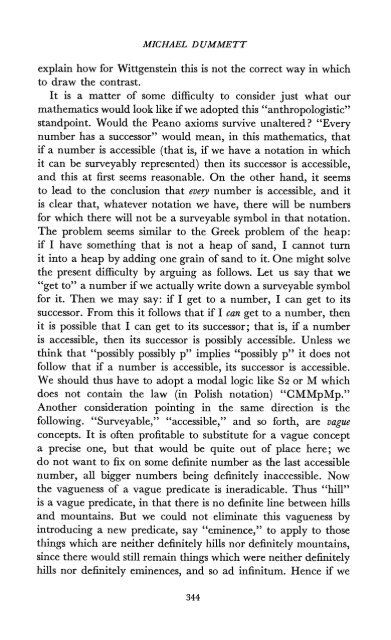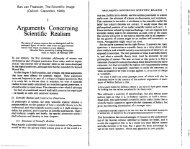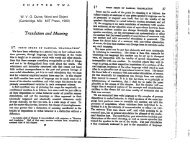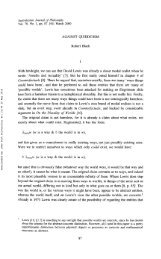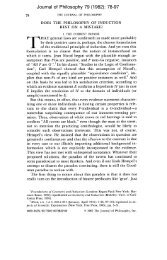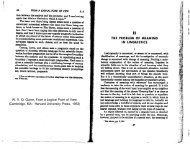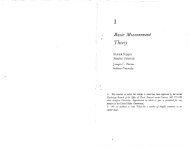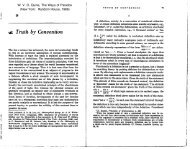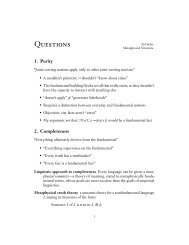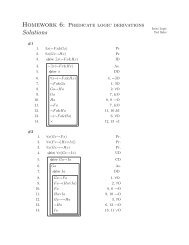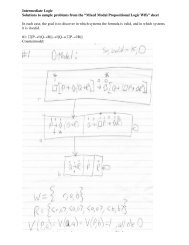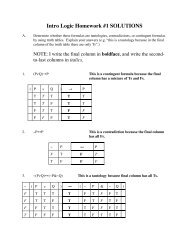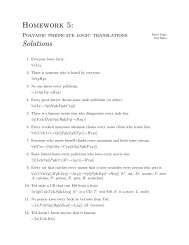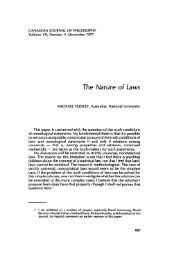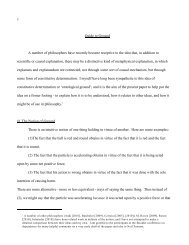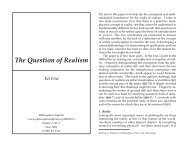Dummett - Wittgenstein's Philosophy of Mathematics.pdf - Ted Sider
Dummett - Wittgenstein's Philosophy of Mathematics.pdf - Ted Sider
Dummett - Wittgenstein's Philosophy of Mathematics.pdf - Ted Sider
You also want an ePaper? Increase the reach of your titles
YUMPU automatically turns print PDFs into web optimized ePapers that Google loves.
MICHAEL DUMMETT<br />
explain how for Wittgenstein this is not the correct way in which<br />
to draw the contrast.<br />
It is a matter <strong>of</strong> some difficulty to consider just what our<br />
mathematics would look like if we adopted this "anthropologistic"<br />
standpoint. Would the Peano axioms survive unaltered? "Every<br />
number has a successor" would mean, in this mathematics, that<br />
if a number is accessible (that is, if we have a notation in which<br />
it can be surveyably represented) then its successor is accessible,<br />
and this at first seems reasonable. On the other hand, it seems<br />
to lead to the conclusion that every number is accessible, and it<br />
is clear that, whatever notation we have, there will be numbers<br />
for which there will not be a surveyable symbol in that notation.<br />
The problem seems similar to the Greek problem <strong>of</strong> the heap:<br />
if I have something that is not a heap <strong>of</strong> sand, I cannot turn<br />
it into a heap by adding one grain <strong>of</strong> sand to it. One might solve<br />
the present difficulty by arguing as follows. Let us say that we<br />
"get to" a number if we actually write down a surveyable symbol<br />
for it. Then we may say: if I get to a number, I can get to its<br />
successor. From this it follows that if I can get to a number, then<br />
it is possible that I can get to its successor; that is, if a number<br />
is accessible, then its successor is possibly accessible. Unless we<br />
think that "possibly possibly p" implies "possibly p" it does not<br />
follow that if a number is accessible, its successor is accessible.<br />
We should thus have to adopt a modal logic like S2 or M which<br />
does not contain the law (in Polish notation) "CMMpMp."<br />
Another consideration pointing in the same direction is the<br />
following. "Surveyable," "accessible," and so forth, are vague<br />
concepts. It is <strong>of</strong>ten pr<strong>of</strong>itable to substitute for a vague concept<br />
a precise one, but that would be quite out <strong>of</strong> place here; we<br />
do not want to fix on some definite number as the last accessible<br />
number, all bigger numbers being definitely inaccessible. Now<br />
the vagueness <strong>of</strong> a vague predicate is ineradicable. Thus "hill"<br />
is a vague predicate, in that there is no definite line between hills<br />
and mountains. But we could not eliminate this vagueness by<br />
introducing a new predicate, say "eminence," to apply to those<br />
things which are neither definitely hills nor definitely mountains,<br />
since there would still remain things which were neither definitely<br />
hills nor definitely eminences, and so ad infinitum. Hence if we<br />
344


